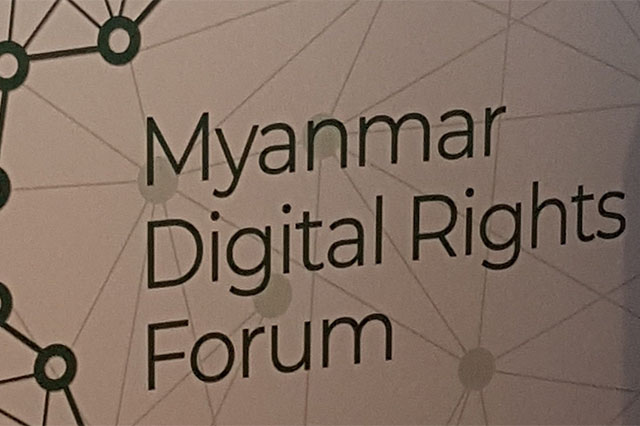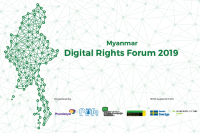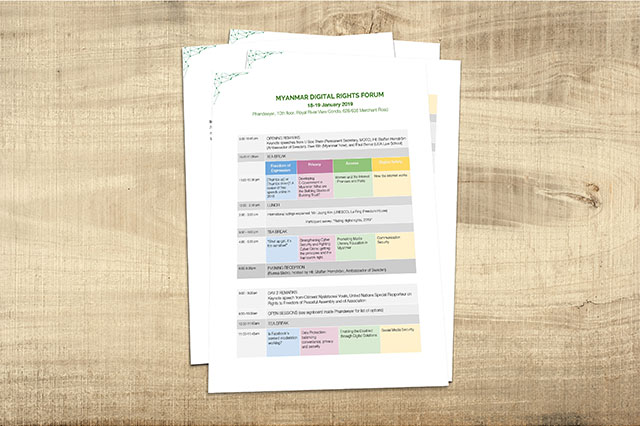Third Myanmar Digital Rights Forum Kicks Off With a Call to Counter Fake News

The third Myanmar Digital Rights Forum began today in Yangon, bringing together 240 participants from across the world with an interest or expertise in freedom of expression, privacy and access to information.
The two-day forum is being attended by senior government officials from the Ministries of Transport and Communication (MoTC), Labour, Information, and Religious and Cultural Affairs, members of parliament, civil society organisations and human rights defenders, journalists and businesses in the tech sector.
The Forum will take stock of the state of digital rights in Myanmar, learn from international experience, and engage stakeholders to identify advocacy and capacity-building priorities for action in 2019. As with the two previous MDRF in 2016 and 2018, the focus will be on Freedom of Expression, Privacy andAccess. Once again the Forum has been co-organised by MCRB, Freedom of Expression Myanmar (FEM), Myanmar Centre for Responsible Business (MCRB), Myanmar ICT Development Organisation (MIDO) and Phandeeyar, where the Forum is taking place, and sponsored by the Embassy of Sweden and Heinrich-Böll-Stiftung Myanmar.
In his keynote address, Permanent Secretary of the MoTC, U Soe Thein told the audience:
"The Government has been working to build proper policy and regulatory framework to build e-government and promote digital economy. In doing so, We will make sure that we will include voices of the people through the public consultations in each step of it. At the same time, we have to protect free speech and users online."
Other keynote speakers included Staffan Herrström, Ambassador of Sweden and Swe Win, leading investigative journalist, and Editor of Myanmar Now. Swe Win described some of challenges Myanmar journalists face in the digital age. These include the ongoing ‘judicial harassment’ he faces as a consequence of a defamation charge under Article 66(d) of the Telecommunications Law filed against him by a supporter of the monk U Wirathu, after he shared an article critical of the monk on his Facebook page. Swe Win also told the audience how he had observed the use of fake news (‘online misinformation’) and fake photos taken from Facebook in content taught at the main civil service training institutes at Phaunggyi and Sibingyi, which he had recently covered for Myanmar Now.
Swe Win told MDRF participants:
“We have escaped the darkness yet, whilst beating a new path, we’ve lost our way. Good journalism uncovers realities and illuminates truth. Although we have been given the freedom to navigate in word, the hidden hands remain. Now more than ever, it is imperative that we make huge sacrifices to disseminate truth. Our drive for justice must not waver until governmental and jurisprudential institutions are both in place and committed to protecting us and to protect the truth. If senior civil servants are being force fed fake news from Facebook as part of their professional training, what hope is there for the government’s reform programme?”
In a video message to the Forum (transcript), digital rights expert Dr Paul Bernal of the University of East Anglia in the UK, and author of The Internet, Warts and All: Free Speech, Privacy and Truth (Cambridge University Press, 2018) talked about how fake news is created to make money and manipulate, and how it can be written to be more believable that the real thing, and targeted on social media to ensure it spreads rapidly, particularly through sharing on Facebook. He identified two ways to tackle fake news:
“The first priority is to make sure that the real and reliable news exists to counter it, including through well-trained journalists. The second way to counter fake news is to improve privacy so that we can reduce the ability of Facebook and other social media to use big data collection and analysis to micro-target fake news and promote its spread”.
Noting that both of these were challenges for Myanmar, which is particularly vulnerable to fake news, he encouraged people in Myanmar to spend less time on Facebook, so as to reduce its dominance including as a news source.
Panel discussions at the 3rd MDRF include
Freedom of Expression
- [Thumbs up] or [Thumbs down]? A review of free speech online
- "Shut up girl, it's too sensitive!"
- Is Facebook's content moderation working?
Privacy
- Developing E-Government in Myanmar: What are the Building Blocks of Building Trust?
- Strengthening Cyber Security and Fighting Cyber Crime: getting the principles and the framework right
- Data Protection: balancing convenience, privacy and security
Access
- Women and the Internet: Promises and Perils
- Promoting Media Literacy Education in Myanmar
- Enabling the Disabled through Digital Solutions
- Community Networks: a potential solution to bridge 'last mile'?
Presentations will be uploaded shortly.
Forum participants also initiated Open Sessions on relevant online issues of interest. These include online information on legislative and parliamentary processes, social media and the Mexican election, legal restrictions on digital content in Myanmar law, women’s rights online, the Myanmar Press Council and digital media; ethnic harmony; universal design and ICT for people with disabilities; human rights education; hate speech and religious intolerance; public participation and digital activism.
As a new addition this year training will be provided for civil society members on a range of issues around Digital Safety and Digital Hygiene.
Read also
- Information and Communication Technologies (ICT) Sector and Digital Rights
- MCRB Submits Input to OHCHR on the Right to Privacy in the Digital Age
- MCRB Submits Input to OHCHR on the Practical Application of the UNGPs to the Tech Sector
- Update on Draft Cybersecurity Law and its Impacts on Digital Rights and the Digital Economy
- Myanmar’s Legal Framework For Cybersecurity Needs To Be Built To International Standards
 English
English မြန်မာ
မြန်မာ မြန်မာ (unicode)
မြန်မာ (unicode)









